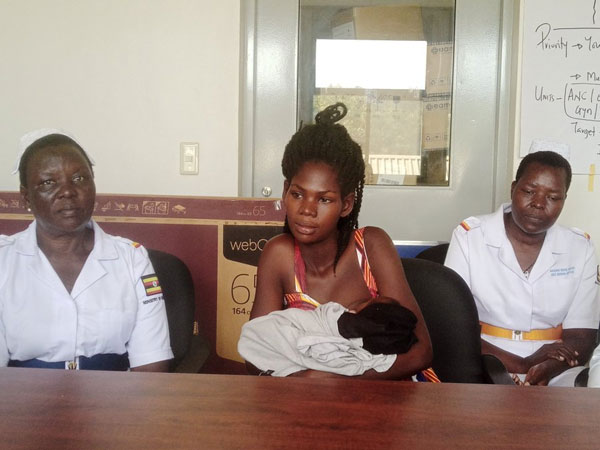
Gulu, Uganda | THE INDEPENDENT | A rare medical journey unfolded when Scovia Aciro,25, a mother of three, discovered that she was pregnant nearly two months after her initial medical tests failed to reveal her condition. Her story, set against the backdrop of Ayweri village in present-day Gulu District, showcases both the complexities and triumphs of medical diagnosis and intervention.
The initial ultrasounds provided contradictory results, puzzling medical professionals as they struggled to identify Aciro’s unusual condition. Ultimately, the prevailing diagnosis would have led to an abortion had it been accurate. However, the subsequent discovery of her pregnancy brought forth new challenges.
Aciro’s first and second pregnancies were uneventful, but her third pregnancy was marred by a rare ectopic condition. An ectopic pregnancy occurs when a fertilized egg attaches itself outside the uterus, most commonly in a fallopian tube. This situation can lead to serious complications, including life-threatening internal bleeding. Aciro’s deteriorating health prompted her transfer from Paibona Health Centre III to Gulu Regional Referral Hospital.
However, her journey was fraught with obstacles. The hospital’s ultrasound machine was initially malfunctioning, and when it was finally operational, it failed to detect the abnormality of her pregnancy. it wasn’t until July 28, 2023, that a confirmatory scan revealed the ectopic pregnancy.
“I was first diagnosed with malaria which was treated but I started experiencing abdominal pain …sometimes it stops me from moving neither can I step foot on the ground but when I went for a scan……. they told me that the baby was not growing in the uterus. I went back home and told people about the results but nobody believed that and I told them that, that is was the doctor told me and the results are here…. I later came back to the hospital and did another operation which showed the same and that is how I was taken for operation and the baby was removed…,”
This discovery marked a turning point in Aciro’s ordeal. Dr. Francis Pebalo, a Gynecologist from Gulu University, led a team of healthcare workers in her care.
The complexity of the case required careful consideration and surgical intervention. Aciro’s baby was encased in her intestine, a condition referred to as “omentum.” The medical team embarked on a delicate surgical process, expanding the encasement and carefully delivering the baby girl via cesarean section.
“This is a rare thing and she is very lucky but one thing that saved this baby from termination was the wrong diagnosis that would indicate that it was a normal pregnancy. It’s a miracle and I must be happy that we have this first case in the region where we can see life coming out,” Dr Pebalo explained.
While successful in saving the baby’s life, Aciro’s journey continued. The placenta, which should have been naturally expelled, required a subsequent operation due to its retention. The challenges posed by the placenta’s retention were significant, affecting the mother’s ability to produce breast milk for the newborn. Despite these hurdles, both Aciro and her baby demonstrated resilience.
Dr. Pebalo emphasized the rarity of Aciro’s case, as ectopic pregnancies usually result in termination due to the threat they pose to the mother’s life. “We don’t have clear statistics of ectopic pregnancy in the Country but worldwide it accounts for 1 percent of all pregnancies and there is no option than to terminate such pregnancy if we must save the mother but this is a rare case that we have seen the baby come out alive,” said.
Throughout this medical odyssey, the importance of early antenatal care emerged as a crucial factor in preventing complications. Timely visits to healthcare facilities allow for early diagnosis and intervention, safeguarding both maternal and fetal health. However, many expectant mothers delay seeking antenatal care, leading to more challenging medical scenarios.
The healthcare system in Gulu has also employed innovative solutions to improve patient care. A WhatsApp group facilitated communication among healthcare workers, enabling timely referrals and expert consultations, as exemplified by Aciro’s case. While the data on ectopic pregnancies remains limited in Uganda, cases are gradually being recognized and documented.
Dr. Richard Mughai, the Assistant Commissioner of Infant and Maternal Health in the Ministry of Health recently noted that at least three cases of ectopic pregnancy have been registered since the beginning of this year.
“Ectopic pregnancies are becoming more common than before, so far the Ministry of Health has registered three cases this year with the recent one being in Gulu though we are yet to study the new trend and draw conclusions on the new phenomenon,” Dr. Mughai told URN.
The medical reports reveal that a significant number of mothers, approximately half of the women with ectopic pregnancies, lack awareness of the associated risk factors. These factors encompass various aspects, including sexually transmitted diseases, drug abuse, pelvic inflammatory diseases, and misuse of family planning methods.
A 2013 study conducted by Makerere University at Mulago Hospital uncovered an upward trend in ectopic pregnancies, with a rate of 19 cases per 1,000 pregnancies. Notably, tubal ectopic pregnancies constituted 84 percent of these cases.
Among the affected mothers, 57 percent had previously dealt with sexually transmitted diseases, 6 percent were active smokers, and misuse of the intrauterine device, a commonly employed family planning method, contributed to the prevailing factors.
******
URN
 The Independent Uganda: You get the Truth we Pay the Price
The Independent Uganda: You get the Truth we Pay the Price


